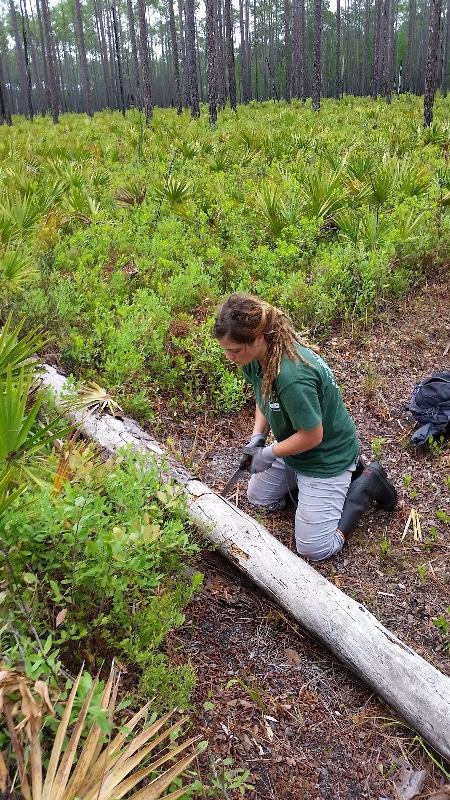Operated by Trout Headwaters, Inc., Waders in the Water (WitW) is an interactive, webinar-delivered training that instructs students in common restoration industry tools, techniques, and processes, workplace safety, and proven, practical, & innovative habitat enhancement. WitW graduates have a path to projects, jobs, and careers in the $10B/Yr restoration economy. Corps that offer the WitW training are better positioned to participate in the growing number of public-private restoration partnerships with for-profit, non-profit and government entities.
This summer, The Corps Network and THI are partnering on a blog series to highlight young adults who have benefited from the WitW experience.

She grew up in the Ozark Mountains of Arkansas where she loved to fish Lake Norfork and the White River with her Dad and Grandfather, “Pa”. It was this draw to nature and the outdoors that, in 2011, led Abbey Toomer to join Florida’s Community Training Works, Inc., also known as Young American Conservation Corps.
Starting as an office assistant in 2011, Abbey, now 28, learned the ins and outs of financing and managing a Corps. After three years in this position, she transitioned to working in the field and training other crewmembers.
Over the years, Abbey numerous certifications and completed trainings in proper ax usage, Wilderness First Aid and CPR, and wildland firefighter basic management. She also completed the Waders in the Water training, which introduced her to water safety and the concept of how all environmental systems are connected. With this experience, Abbey spent three months in Mississippi training new Corpsmembers with Climb CDC Conservation Corps in skills such as endangered species tracking, processing, handling, and cataloging invasive species.
Abbey has worked mostly in the Florida Panhandle, but has also worked in Ft. Lauderdale, St. Augustine, and on the Florida National Scenic Trail. Recently, she and her crewmembers are worked with the Gulf Specimen Marine Laboratory to expand Living Dock; a learning platform used by thousands of school children, marine biology and aquaculture students, and medical and scientific researchers. They also recently partnered with Florida State University’s Coastal and Marine Laboratory on oyster restoration, coastal restoration and trail maintenance.
Abbey believes the Waders in the Water program provided her insight into new perspectives on nature. While she has always considered herself environmentally conscious and tries to live as “green” as possible, Abbey’s made some changes since the training. She now uses a “First, Do No Harm” approach in her work, pausing to assess both the environment and proposed solutions before taking any action. She asks herself, “Is this solution really the BEST thing to do for nature and this particular habitat?” Abbey strives to help Mother Nature heal herself, instead of counting on nature to fix whatever problems humans impose. She now considers the unique qualities and needs of each project location, knowing that, in restoration or rehab work, one size rarely fits all.
The professional training she has received through WitW gave Abbey greater confidence to work on bigger restoration projects and communicate more knowledgably with land and project managers. She is excited about continuing Gulf Coast restoration work and looks forward to, along with her team, applying the knowledge she gained through WitW.
“So many folks living in rural Arkansas, and other communities throughout the US that struggle with crippling high unemployment, could really benefit from this training,” reflected Abbey. “These folks would not only become better job candidates for organizations and companies restoring lands and waters, but they would also improve their lives, the lives of their families, and their communities, for many years to come.”





































































